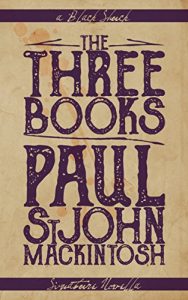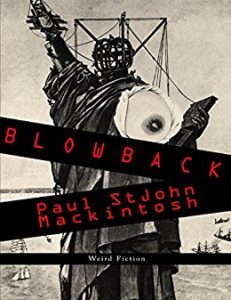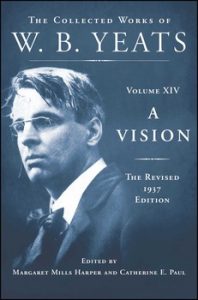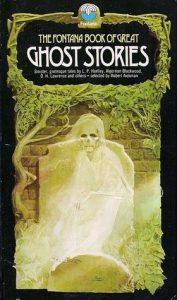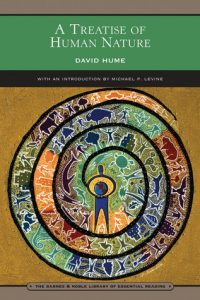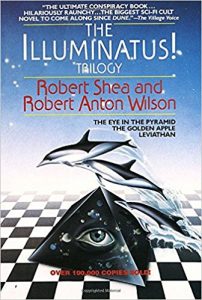Feeling paranoid? Want to muse over the nature of weird fiction and the philosophies of its creators? Then here’s one of our occasional guest posts by writer and journalist Paul StJohn Mackintosh, exploring the views of Conrad, Lovecraft, Yeats and Borges, human nature, reality and occultism. Paul’s article ‘On Lovecraft’s Legacy’ was one of our most widely read pieces last Autumn, and whilst this level of thinking sometimes hurts our brains, we’re always pleased to offer interesting opinion pieces from others in the field. So here you go…
USUAL DISCLAIMER: All the views expressed below belong to the author of the article, who knows some quite long words.
THE WEIRD, HORROR, SUPERNATURAL AND THE OCCULT
Paul StJohn Mackintosh
I used the quote from Joseph Conrad (later below) that kicks off this essay once before, in the preface to Blood Rust, my suspense thriller about contemporary Scandinavian neo-fascism. Why that quote, there, and why here? Because Conrad was writing a story on the borderline between the supernatural and the merely strange, and wanted to explain why he preferred the latter. And because my novel was all about fanatics who believed the most ludicrous occult and supernatural mystical doctrines, sincerely enough to massacre for them. And because that novel is a thin gloss on what is going on for real, right now. This essay is about occultism and the supernatural as the gateway drug for anti-rationalism and neo-fascism.
This topic was also prompted by the development of my work. When I published my first collection, Black Propaganda (a.k.a. Blowback on Kindle), it contained 13 stories, and I didn’t need long to work out that only 4 of those stories had remotely supernatural content. If many of the rest passed muster as science fiction, they did so only marginally, as soft SF of the loosest kind. Yet all, I reckoned, were utterly weird tales, and all but one, horror stories, that nonetheless went (almost) nowhere near slasher fiction. Some of the other stories that I’ve been proudest of are very weird tales that hardly depart from mundane realities at all.
Conrad wrote in his author’s note to the 1920 second edition of The Shadow Line as follows:
“This story, which I admit to be in its brevity a fairly complex piece of work, was not intended to touch on the supernatural. Yet more than one critic has been inclined to take it in that way, seeing in it an attempt on my part to give the fullest scope to my imagination by taking it beyond the confines of the world of the living, suffering humanity. But as a matter of fact my imagination is not made of stuff so elastic as all that. I believe that if I attempted to put the strain of the Supernatural on it, it would fail deplorably and exhibit an unlovely gap. But I could never have attempted such a thing, because all my moral and intellectual being is penetrated by an invincible conviction that whatever falls under the dominion of our senses must be in nature and, however exceptional, cannot differ in its essence from all the other effects of the visible and tangible world of which we are a self-conscious part. The world of the living contains enough marvels and mysteries as it is; marvels and mysteries acting upon our emotions and intelligence in ways so inexplicable that it would almost justify the conception of life as an enchanted state. No, I am too firm in my consciousness of the marvellous to be ever fascinated by the mere supernatural, which (take it any way you like) is but a manufactured article, the fabrication of minds insensitive to the intimate delicacies of our relation to the dead and to the living, in their countless multitudes; a desecration of our tenderest memories; an outrage on our dignity.
“Whatever my native modesty may be, it will never condescend so low as to seek help for my imagination within those vain imaginings common to all ages and that in themselves are enough to fill all lovers of mankind with unutterable sadness. As to the effect of a mental or moral shock on a common mind, that is quite a legitimate subject for study and description. Mr. Burns’ moral being receives a severe shock in his relations with his late captain, and this in his diseased state turns into a mere superstitious fancy compounded of fear and animosity. This fact is one of the elements of the story, but there is nothing supernatural in it, nothing so to speak from beyond the confines of this world, which in all conscience holds enough mystery and terror in itself.”
Citing this passage in an interview in the Paris Review, Jorge Luis Borges said: “Conrad thought that when one wrote, even in a realistic way, about the world, one was writing a fantastic story, because the world itself is fantastic and unfathomable and mysterious.” He then quoted Adolfo Bioy Casares declaring: “I think Conrad is right. Really, nobody knows whether the world is realistic or fantastic, that is to say, whether the world is a natural process or whether it is a kind of dream, a dream that we may or may not share with others.”
I wouldn’t go that far, and above all, I wouldn’t bring dream into the waking world. Conrad specifically declares that the “marvels and mysteries” of “an enchanted state” are explicitly part of “the visible and tangible world of which we are a self-conscious part.” Reflect on the enormous imaginative richness and variety of his fiction, and you see very clearly that his creative power needed no help from the invisible and intangible.
My personal take on horror and/or weird fiction is that it essentially concerns disturbances of the normal expected order. It doesn’t concern the unexpected and completely different order of an entire imagined fantasy, future, or alternative world, because obviously there’s no shock of disturbance there. Those disturbances can include the supernatural. They can also include the visceral revelation that human beings are bags of gore that can be spilt and shed, or that the human personality comprehends incomprehensible obscenities. Or that life comes round in fateful circles. Or simply that one day we all die. None of this requires any supernatural explanation at all, never mind any fully worked-out occult system.
Lovecraft
The weird fiction community won’t need reminding that H.P. Lovecraft begins “Supernatural Horror in Literature” by asserting that “the oldest and strongest emotion of mankind is fear, and the oldest and strongest kind of fear is fear of the unknown.” The “oldest and strongest” in that statement may be open to dispute, but it should be obvious that literature which probes the limits, and especially the break points, of our comprehension of our condition will have enduring power and value. (Flaubert’s Madame Bovary and “The Legend of Saint Julian the Hospitaller” could be considered as two attempts to do just that, from completely different directions.) As Lovecraft says, this probing of the outer limits “must establish for all time the genuineness and dignity of the weirdly horrible tale as a literary form.” But unknown does not necessarily mean unknowable or occult; weirdly horrible does not have to mean other-worldly or supernatural. Tzvetan Todorov defines fantastic literature as narratives that “hesitate between a natural or supernatural explanation of the events described.” The power of fantastic literature derives precisely from that hesitation, which never actually has to be resolved, and which can remain in doubt all the way through the story. The hesitation and irresolution can add even more power as it mimes the doubt and confusion we face at the limit conditions of our comprehension and being. Does anything explicitly supernatural happen in “The Fall of the House of Usher” or “The Tell-Tale Heart”? If not, does this mean that Poe wrote these tales in a completely different genre to “The Masque of the Red Death”? A writer can resolve that hesitation with either a natural or a supernatural explanation, and Lovecraft goes into immense detail on the instances and consequences of authors resolving those hesitations one way or the other. Vernon Lee, in her “Faustus and Helena,” devotes an entire essay to the proposition that the true supernatural is inherently hostile to any concrete artistic representation, never mind explanation, at all. Some writers, though, will go beyond a supernatural explanation to an explicitly occult one. Those writers, and their reasons, are what concerns me.
One such writer was W.B. Yeats, in his plays, and in the occult system of A Vision, which George Orwell dissected elegantly in his 1943 essay on the poet: “As soon as we begin to read about the so-called system we are in the middle of a hocus-pocus of Great Wheels, gyres, cycles of the moon, reincarnation, disembodied spirits, astrology and what not. Yeats hedges as to the literalness with which he believed in all this, but he certainly dabbled in spiritualism and astrology, and in earlier life had made experiments in alchemy.” And Orwell continues:
“Yeats’s tendency is Fascist. Throughout most of his life, and long before Fascism was ever heard of, he had had the outlook of those who reach Fascism by the aristocratic route. He is a great hater of democracy, of the modern world, science, machinery, the concept of progress – above all, of the idea of human equality. Much of the imagery of his work is feudal, and it is clear that he was not altogether free from ordinary snobbishness. Later these tendencies took clearer shape and led him to ‘the exultant acceptance of authoritarianism as the only solution. Even violence and tyranny are not necessarily evil because the people, knowing not evil and good, would become perfectly acquiescent to tyranny. . . . Everything must come from the top. Nothing can come from the masses’.”
The same essay goes on to outline the occult obsessions of fascists, already obvious in the French far-right press of the pre-war period, and of course, far more blatant in the post-war post-mortems of Nazism. “It is not clear at first glance why hatred of democracy and a tendency to believe in crystal-gazing should go together,” says Orwell, then explains: “the very concept of occultism carries with it the idea that knowledge must be a secret thing, limited to a small circle of initiates. But the same idea is integral to Fascism. Those who dread the prospect of universal suffrage, popular education, freedom of thought, emancipation of women, will start off with a predilection towards secret cults.”
Actually, there is a pretty obvious reason why hatred of democracy and a tendency to believe in crystal-gazing should go together. Occultism implies rejection of rationalism, which itself holds that the universe’s secrets are accessible to rational inquiry, and potentially to all rational beings, who are at least potentially equal; as per the Church-Turing thesis which holds that any real-world computing device can in principle manage the computing functions of any other such device, given enough time and resources. Rationality establishes an almost mathematical basis for human equality. Rational principles don’t require any elaborate hierarchy of initiation and personal growth to access them; they are as transparent and universally accessible as a mathematical formula. Consequently, anyone starting from a hatred of equality, from fear and disdain of the unwashed horde, will be driven to reject reason too. And they will likely do so by retreating to a system of deliberate obscurantism and exclusion.
Borges
Borges shared Yeats’s snobbish disdain for the masses, and loathed Peronism, and this pushed him even further than Yeats into active support of real fascism, when he served as window-dressing for the murderous Videla regime. “For a long time I believed in democracy. Now I don’t believe in it; at least not in my own country,” Borges declared in Chile in 1976. “Democracy [is] an abuse of statistics . . . No one supposes that a majority of people can have valid opinions about literature or about mathematics, but it is believed that everyone can have valid opinions about politics, which is more delicate than the other disciplines . . . Yes, it seems that to destroy liberty is bad. But liberty lends itself to so many abuses. There are certain liberties which constitute a form of impertinence.” Borges may have had a personal grudge thanks to his experience under the heel of Peronist demagogy, but notwithstanding, Yeats’s social and intellectual snobbery looms large in him as well. His literary scholasticism, and Mallarme’s attempts “to purify the dialect of the tribe,” may represent some of the closest attempts to push aesthetic refinement and the cultivation of connoisseurship to the edge of the occult. Other writers didn’t hesitate to take the plunge.
One such was Robert Aickman, who implicitly in his fiction, and explicitly in his introductions to his anthology work in the Fontana Books of Great Ghost Stories, eulogized “the submerged nine-tenths” of unconscious mental experience, and declaring that the ghost story “need offer neither logic nor moral,” and that “everything that matters is indefinable.” Aickman was apparently a persistent and convinced ghost hunter and spiritualist, though as with Yeats, how far he really believed in this, as opposed to wanting to believe, is open to question. He certainly went through all the motions. And again as with Yeats, hatred and disdain of rationalism, equality and the masses, all of which have “destroyed all hope of quality in living,” are there in full force in Aickman’s work. When he warns that “the one-tenth, the intellect, is not looking after us,” he is doing so in a very different vein to Nietzsche warning that “your bad impulses also thirst for freedom. Your wild dogs want liberty; they bark for joy in their cellar when your spirit endeavours to open all prison doors.”
What kind of literature are such personalities likely to produce? Psychology contributes some insights that occultists and fascists have done nothing to contradict. Occultism itself attempts to graft meaning and structure onto the world to satisfy inner impulses and subdue existential fears, without reference to external reality. This resembles apophenia, defined by German psychiatrist Klaus Conrad, in a study on the early stages of schizophrenia, as an “unmotivated seeing of connections [with] a specific feeling of abnormal meaningfulness.” August Strindberg’s Occult Diary is riddled with instances, apophanies, that are now used as examples by psychologists researching the phenomenon. Apophanies have been described as “entirely self-referential, solipsistic, and paranoid,” which also sounds like a pretty good thumbnail description of the fascist mentality. And in genre fiction, you couldn’t wish for a more obvious example than The Lord of the Rings, which China Miéville has characterized as the “neurotic, self-contained, paranoid creation of a secondary world… an impossible world which believes in itself.” No wonder Tolkien’s work has so often been cited as crypto-fascist.
One of the key symptoms of paranoia is attribution bias, a cognitive defect that integrates observed behaviour into a personal, often self-focused worldview. This often correlates with abandonment of consensus social norms and ideologies, frequently by way of corrosive scepticism and nihilism. All of this helps explain why Lovecraft, the self-professed materialist, embraced eugenic theories with an extremely selective bias against competing scientific analyses, in blithe indifference to the actual processes of scientific enquiry. Paranoia is also strongly correlated with social marginality, exclusion, and low self-esteem, often compensated for by conspiracy theories – all of them characteristic of the founding fathers of fascism. Look at what happens to even a moderately independent mind like David Hume, when he recounts his personal experience as a thinker in society in his conclusion to Book 1 of A Treatise of Human Nature: “I am first affrighted and confounded with that forelorn solitude, in which I am placed in my philosophy, and fancy myself some strange uncouth monster, who not being able to mingle and unite in society, has been expelled all human commerce, and left utterly abandoned and disconsolate. Fain would I run into the crowd for shelter and warmth; but cannot prevail with myself to mix with such deformity. I call upon others to join me, in order to make a company apart.”
Paranoia and Fake News
Paranoid social cognition is linked to perceived social distinctiveness, perceived social scrutiny, and social insecurity (again, Lovecraft, anyone?). All of these may correlate with nihilism, and with the insecure, wounded self underlying narcissism. It shouldn’t be hard to see how already fragile personalities falling within this spectrum develop self-reinforcing, validating personal philosophies, opposed to communal norms and perceived domestic or external threats, especially when social and even economic factors can help trigger their personal pathologies. Some readers may object that this reduces philosophies to symptoms: I’d answer that this is not reductionism, but simply accounts for the ground that such creeds grow from, and which can bias their growth. You certainly don’t need to look much further to account for the proliferation of Julius Evola fans, and enthusiasts of other neo-fascist credos in certain byways of genre fandom, including bulletin boards, where cognitive bias runs rampant enough to satisfy any alt-right peddler of fake news.
Amid the glut of analysis on the 2016 US presidential elections, one strand that has emerged very clearly is the paranoid appeal of fake news to the same underlying drives and uncertainties that bolster both fascism and occultism. Confirmation bias is one factor. So is the allure of being part of the inner coterie of truthsayers who know the great hidden secret. So is social exclusion: the factors that trigger paranoia, including low self-esteem, compensatory narcissism, and lack of purpose, figure large among the audience for conspiracy theories.
Umberto Eco made an especially cutting critique of an earlier and very successful instalment of fake news and conspiracy theory, the “silly, sub-Christian superstitions of The Da Vinci Code. It is amazing how many people take that book literally, and think it is true.” On its relation to the occult in general, he said: “The so-called occult sciences do not ever reveal any genuine secret: they only promise that there is something secret that explains and justifies everything. The great advantage of this is that it allows each person to fill up the empty secret ‘container’ with his or her own fears and hopes. As a child of the Enlightenment, and a believer in the Enlightenment values of truth, open inquiry, and freedom, I am depressed by that tendency. This is not just because of the association between the occult and fascism and Nazism – although that association was very strong. Himmler and many of Hitler’s henchmen were devotees of the most infantile occult fantasies. The same was true of some of the fascist gurus in Italy – Julius Evola is one example – who continue to fascinate the neo-fascists in my country. And today, if you browse the shelves of any bookshop specialising in the occult, you will find not only the usual tomes on the Templars, Rosicrucians, pseudo-Kabbalists, and of course The Da Vinci Code, but also anti-semitic tracts such as the Protocols of the Elders of Zion.” New Age rejection of reason, and the appeal to paranoid self-referential solipsism, are a far more important common theme on the shelves of those bookshops than any single ideology or shared, consistent creed.
What of the likes of Alan Moore or Grant Morrison, counter-culture far-left writers and practising occultists? Obviously, they don’t fall into the neo-fascist camp. Self-referential solipsism, though? Check. Narcissism? Check. Felt social exclusion? Check. Conspiracy theories and elaborate paranoid schemata? Check. The elan of being part of the inner circle of masters of reality who see through the grand conspiracies of the Establishment? Check. At least Robert Shea and Robert Anton Wilson had their tongues firmly wedged in cheek when they whipped up the Illuminatus! Trilogy. Remember that they were inspired by their stints at Playboy magazine fielding conspiracy rants from correspondents, to create a metafiction on the premise that “all these nuts are right, and every single conspiracy they complain about really exists”. Fnord knows, there’s now enough members of the public who believe the Illuminatus! Trilogy is literally true. And enough past literary radicals on the far left have bled over into the far right, from anarchism to fascist nihilism, socialism to National Socialism. Have we got to spend our time wondering whether Alan Moore believes in his occult systems? Neo-fascist Odinists in Scandinavia and elsewhere apparently do believe in theirs, and use them to guide and justify their actions, and that’s only one example.
Personally, I’m going to continue writing supernatural fiction, and enjoy doing so. But I’ll continue to regard my supernatural stories as far more contiguous with my SF, fantasy, slasher fic, thrillers, historical dramas, dark erotica, and just plain weird or disturbing tales, than they are with any actual occultism. All of them activate the imagination, rather than levering credulity. They invite a suspension of disbelief, rather than demanding belief. They probe the borders of our condition without presuming to project beyond it. Others clearly haven’t been so careful.
As all this suggests, I don’t find prosaic, mundane reality anywhere near as limiting, or as lacking in romance and imaginative inspiration, as some supernatural fiction writers and occultists claim to. Obviously, it didn’t hamper Umberto Eco any, even if there may now be an alarming number of readers who believe that The Name of the Rose and Foucault’s Pendulum are literally true. And reality offers what occultists can’t – openness, fresh air, light. Hume again: “I dine, I play a game of backgammon, I converse, and am merry with my friends; and when after three or four hours’ amusement, I would return to these speculations, they appear so cold, and strained, and ridiculous, that I cannot find in my heart to enter into them any farther. Here then I find myself absolutely and necessarily determined to live, and talk, and act like other people in the common affairs of life.”
c. Paul StJohn Mackintosh, 2018
Paul StJohn Mackintosh is a Scottish poet, writer of weird fiction, translator and journalist. Born in 1961, he was educated at Trinity College, Cambridge, has lived and worked in Asia and Central Europe, and currently divides his time between Hungary and other locations.
His previous greydogtales article can be found here:
http://greydogtales.com/blog/paul-stjohn-mackintosh-on-lovecrafts-legacy/
And his latest work, a short novel entitled The Three Books, is out now from Black Shuck Books, available on Amazon.
“Tragedy, urban legend, Gothic romance, warped fairy tale of New York: it’s all there. And of course, most important of all is the seductive allure of writing and of books – and what that can lead some people to do. You may not like my answer to the mystery of the third book. But I hope you stay to find out.”
Amazon UK http://amzn.eu/1Cg4Og9
Amazon US http://a.co/e5WVk7A
